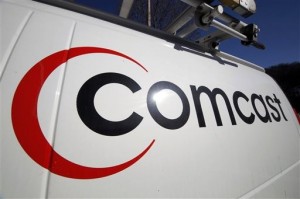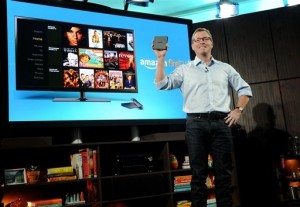
Comcast plans to sell some cable systems to competitor Charter Communications Inc., to help Comcast’s acquisition of Time Warner Cable clear regulatory hurdles, the company announced this morning. (AP Photo/Gene J. Puskar, File)

Amazon’s Peter Larsen introduces Amazon Fire TV during a press conference in New York on Wednesday, April 2. At $99, Amazon claims Fire TV is the easiest way to watch Netflix, Prime Instant Video, Hulu Plus, WatchESPN, and more on a big-screen TV. (Photo by Diane Bondareff/Invision for Amazon/AP Images)
WESTFIELD – City residents may not see anything different in the cable television services provided by Comcast, but the 10-year contract with the city’s cable provider expired last month.
The city’s Cable Television Commission, which advises Mayor Daniel M. Knapik about contract issues, recently toured the facilities at Westfield State University to determine what equipment the city needs to acquire to improve the quality of local broadcast channels and Comcast services to the city’s 13,000 cable subscribers.
Community Development Director Peter J. Miller Jr., said the recent commission meeting held at the university’s broadcast studio was to allow commission members to “get a feel for the operational side” of the city’s local access services.
“We went through the university’s facility and checked out the studio and the equipment the city has there. It gave the members an opportunity to see what the university is providing for services and what equipment we need to make the (local access) services more attractive,” Miller said.
That information will assist the commission in determining some of the issues to be addressed in the new contract.
Miller said that Knapik signed a preliminary denial because “the clock ran out” on the former contract before a new agreement was put into place. Knapik is empowered under state telecommunication law to sign a new contract, but has several reservations which have yet to be addressed by Comcast.
“We sent the rejection letter and now we’re just waiting for Comcast to respond,” Knapik said, adding that the term of the new contract is a key issue for both parties.
Comcast is seeking a long-term contract similar to the 10-year pact which expired on March 29, 2014, while the city is seeking a contract with a five-year term, Miller said.
“Sticking points are the length of the term of the contract, some technical issues to improve local access broadcast capabilities and keeping the (East Mountain Road) office open,” Miller said.
Knapik said that his desire for a shorter contract term is directly linked to the rapid evolution of technology and changes in the structure of the telecommunications industry as corporations acquire competitors and introduce emerging technology to the market.
“We don’t want to be locked into a 10-year deal because the technology and the industry is evolving in huge jumps today,” Knapik said.
Miller said he is optimistic that the issues will be resolved with Comcast and that the city will agree to a new contract, but until then the terms of the expired contract will remain in force.
“We’re getting there. We’ll work it through,” Miller said. “Comcast agreed to reopen the contract negotiation within two weeks.”
Meanwhile, Comcast plans to shed about 3.9 million subscribers in a deal with cable competitor Charter Communications Inc. to help Comcast’s acquisition of Time Warner Cable clear regulatory hurdles.
Comcast is creating and spinning off a new publicly traded cable provider that will serve about 2.5 million of its existing customers. Charter will form a new holding company that will have an approximately 33 percent stake in the Comcast spinoff. Comcast stockholders and former Time Warner Cable shareholders are expected to own about 67 percent of the new company.
In February Comcast Corp.’s $45.2 billion bid topped Charter’s offer for Time Warner Cable Inc.
Comcast said this morning that the combined Comcast-Time Warner Cable will divest systems to Charter, resulting in a reduction of about 3.9 million video customers.
Once the Comcast-Time Warner Cable deal closes, Charter will acquire about 1.4 million existing Time Warner Cable subscribers. This will boost Charter’s current residential and commercial video customer base to about 5.7 million from 4.4 million. Charter and Comcast will also each transfer about 1.6 million customers to the new company.
Charter said in an investor presentation that it estimates the acquisition of the cable systems, which gives it about 1.4 million Time Warner Cable subscribers, will cost approximately $7.3 billion. It estimates the value of the spinoff company at about $14.3 billion.
Comcast said that the new cable provider it is creating and spinning off will have a nine-member board. That will include six independent directors and three appointed by Charter. Comcast itself will have no ownership stake in the spun off company and will have no role in managing it. Charter will offer management services to the new company.
Both Comcast and Charter’s boards have approved the transactions, which are subject to Comcast’s deal with Time Warner Cable closing, approval by Charter shareholders and other conditions. Time Warner Cable’s board has also given its necessary approval.
Comcast said it plans to use proceeds from the transactions to lower its debt. It still anticipates its combination with Time Warner Cable bringing about $1.5 billion in operating savings. The combination is targeted to close by the end of the year.
And last week, Netflix announced it is joining the lineup of three US cable-TV services.
Netflix’s Internet video service is about to join the programming lineup of three small cable-TV providers in the U.S., a breakthrough that acknowledges the growing popularity of online entertainment.
The agreements with Atlantic Broadband, RCN Telecom Services and Grande Communications gives Netflix’s subscription service a channel on the TiVo boxes that the three cable services provide their customers. Netflix will debut on Atlantic and RCN today and then will expand on to Grande’s service by end of next month.
Collectively, the three cable-TV services have about 820,000 subscribers scattered through nine states and Washington D.C.
Although that’s a small fraction of the cable-TV market, the deals represent another milestone for Netflix Inc. as it tries to make its Internet video service more like premium channels such as HBO and Showtime.
Netflix already had landed spots on the cable-TV boxes of services in England, Denmark and Sweden, but hadn’t been able to make similar inroads in the U.S. until now. The company’s nearly 36 million U.S. subscribers typically have to buy a separate device, such as video game console or a player from Roku or Apple Inc., if they want to stream video on to their TVs. That method usually requires a separate remote and an additional step to flip over to a different TV input to see the picture.
Now, Netflix will be like any other channel on the cable-TV dial except that it relies on a high-speed Internet connection to deliver its video.
“We think this signals a new generation of cable-TV service of offerings,” said David Isenberg, Atlantic’s chief marketing and strategy officer. “It’s a watershed moment.”
He likened what Netflix is doing for Internet video to what HBO did for cable-TV when that service began transmitting through satellites in the early 1970s.
Netflix has been striving to become more HBO-like since it expanded upon its DVD-by-mail service and began offering Internet streaming seven years ago. In the past two years, the Los Gatos, Calif., company has been featuring more original programming, such as the critically acclaimed “House of Cards” and “Orange Is The New Black,” to persuade more U.S. subscribers to pay $8 per month for its service.
To help pay for its rising programming costs, Netflix plans to raise its prices by $1 or $2 by July. The higher prices initially will only affect new customers.
HBO, which is owned by Time Warner Inc., views Netflix as such a competitive threat that it has steadfastly refused to licenses its old TV shows, such as “The Sopranos” and “The Wire,” to the Internet video service. Those HBO shows instead will be streamed through a rival Internet video service offered through Amazon.com Inc.’s Prime shipping service as part of deal announced earlier this week.
“HBO fears Netflix’s growing industry power,” BTIG Research analyst Richard Greenfield wrote in a Thursday blog post. “We suspect HBO wanted to balance Netflix’s growing media industry hegemony by helping to bolster their largest direct-to-consumer … competitor — Amazon.”
Unlike their partnerships with HBO and Showtime, the cable-TV providers aren’t offering a Netflix subscription as part of their bundled packages. People will still have to open a Netflix account through the company’s website or mobile application, although Atlantic is trying to make that process easier by offering a way to sign up on the TV screen.
Netflix is still hoping to be added to the programming lineup of a major cable-TV service. It seems unlikely that Netflix will make its way onto a cable box offered by the biggest service, Comcast Corp any time soon. The relationship between the two companies has grown frosty because Netflix is opposing Comcast’s proposed $45 billion purchase of another major cable-TV service, Time Warner Cable Inc.
RCN Telecom has 440,00 subscribers in Washington, D.C., Philadelphia, New York City, Boston, Chicago and Leigh Valley, Pa. Atlantic, which is owned by Canada’s Cogeco Cable, has 230,000 subscribers in western Pennsylvania, Maryland, Delaware, Miami Beach, Fla. and Aiken, S.C. Grande has 150,000 subscribers in Texas.

